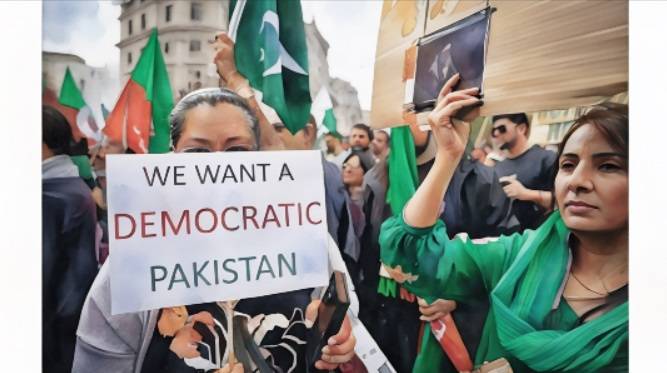
Pakistan’s democratic future stands at a crossroads. With former Prime Minister Imran Khan incarcerated, the military establishment entrenched in politics, and civil liberties eroding, the country teeters on the edge of a garrison mentality—where authoritarianism masquerades as governance. As the world’s fifth-largest nation with a population of 240 million, including a youth demographic second only to India’s, Pakistan’s potential is immense. However, its path forward depends on whether it can transition peacefully from militarized authoritarianism to a genuine democracy.
History offers compelling lessons from countries that have overcome similar challenges, providing a roadmap for Pakistan to escape its current crisis.
Indonesia: Impeaching Suharto and Rebuilding Institutions
Indonesia’s transition from Suharto’s three-decade dictatorship to democracy demonstrates the power of institutional reform and grassroots mobilization. By 1998, after years of corruption, nepotism, and economic collapse during the Asian financial crisis, Suharto faced growing discontent. Massive protests, led by students and civil society, alongside defections from political elites, forced his resignation.
Post-Suharto reforms prioritized decentralization, reducing Jakarta’s control over provinces, and strengthening civil institutions. These changes curtailed the Indonesian military’s grip on governance, allowing democratic processes to flourish.
For Pakistan, the lesson is clear: active civil society, decentralization, and legislative reforms that reduce the role of the security apparatus in politics are critical. Grassroots pressure combined with incremental changes can pave the way for sustainable democratic governance.
Turkey: Defending Democracy Against Coups
Turkey’s resilience during the 2016 coup attempt is another instructive example. When factions within the military sought to overthrow the government, millions of citizens took to the streets, confronting tanks and defying curfews to defend democracy. Despite challenges under President Recep Tayyip Erdoğan’s leadership, the public’s defiance of the coup demonstrated the power of collective action.
For Pakistan, the lesson is clear: active civil society, decentralization, and legislative reforms that reduce the role of the security apparatus in politics are critical
Pakistan must similarly cultivate a culture where democracy is seen as a non-negotiable public good. Imran Khan’s Pakistan Tehreek-e-Insaf (PTI) has already mobilized millions, particularly youth, around the idea of civilian supremacy. However, this energy must be channeled into institution-building—ensuring an independent judiciary, free press, and transparent electoral systems. While charismatic leadership is important, robust institutions are essential for long-term democratic resilience.
Afghanistan: Pragmatic Engagement With Entrenched Powers
Afghanistan’s history of war and its current Taliban-led government might seem like an unlikely source of lessons for Pakistan. However, the United States’ recalibrated approach to engage pragmatically with Taliban leadership offers insights into managing entrenched power structures. Washington now focuses on fostering pragmatic relationships with reformist Taliban leaders while supporting civil society initiatives, such as women’s entrepreneurship and internet-based education.
Pakistan’s security establishment, like the Taliban, has wielded disproportionate power for decades. A peaceful transition to democracy requires a similar pragmatic approach—engaging reformist factions within the establishment while empowering democratic actors and civil society. The international community, too, must adopt a nuanced stance, supporting Pakistan’s democratic transition without resorting to punitive measures like sanctions or unfeasible structural reforms.
Bangladesh: Economic Development as a Foundation
Bangladesh’s journey from the turmoil of 1971 to its current political stability is both cautionary and instructive. While the country still grapples with the aftermath of corruption and authoritarianism under Sheikh Hasina’s now toppled government, its focus on economic development has been a stabilizing force. Policies promoting women’s empowerment, infrastructure development, and poverty reduction have strengthened its democratic foundations.
Pakistan, too, must prioritize economic stability. Policies that address regional disparities, empower women, and create job opportunities for its youth can mitigate the frustrations that often lead to political unrest. Equally important is addressing historical grievances, particularly in Balochistan and other marginalized regions, through reconciliation and development initiatives.
Five Steps for Pakistan’s Democratic Transition
To transition from a garrison state to a democracy, Pakistan must:
- Reclaim Civilian Supremacy: Draw inspiration from Indonesia’s reforms to reduce the military’s role in governance. Constitutional amendments and decentralization are critical.
- Empower Citizens: Like Turkey, Pakistan must foster democratic participation as a national value. Free elections, an independent judiciary, and media freedom are essential.
- Engage Pragmatically: As in Afghanistan, gradual engagement with reformist factions within the military can ease the transition to civilian rule.
- Focus on Economic Stability: Bangladesh’s success underscores the importance of addressing economic inequalities and empowering marginalized groups.
- Secure International Support: The global community should support Pakistan’s transition through diplomatic engagement, trade, and assistance—not through IMF-imposed austerity or economic sanctions.
Imran Khan’s Role in Pakistan’s Democratic Future
Imran Khan symbolizes the potential for transformative leadership. His incarceration highlights the challenges of confronting entrenched military power, but his movement has already mobilized millions in Pakistan and abroad. Like Indonesia’s activists, Turkey’s street defenders, and Bangladesh’s resilient reformers, Khan’s supporters must focus on rebuilding democratic institutions rather than relying solely on charismatic leadership.
Pakistan stands at a pivotal moment. It can remain mired in a cycle of authoritarianism, or it can choose the harder but more rewarding path of democratic resilience. By learning from the successes and failures of countries like Indonesia, Turkey, Afghanistan, and Bangladesh, Pakistan has the opportunity to carve its own path to a peaceful, prosperous, and democratic future. The choice is clear, but the road requires courage, commitment, and collective action.

